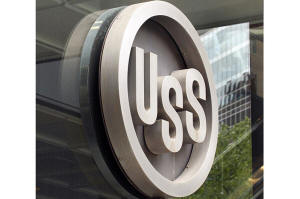US government to have control in Nippon Steel-U.S. Steel deal, Trump and
Sen. McCormick say
[May 28, 2025] By
MARC LEVY
HARRISBURG, Pa. (AP) — U.S. Sen. David McCormick said Tuesday that an
arrangement that will allow Japan-based Nippon Steel to invest in U.S.
Steel will guarantee an American CEO, a majority of board members from
the United States and U.S. government approval over certain corporate
functions.
The Pennsylvania senator spoke on CNBC, four days after President Donald
Trump suggested that an agreement on a “partnership” was at hand to
resolve Nippon Steel's nearly $15 billion bid to buy iconic American
steelmaker U.S. Steel that has been blocked on national security
grounds.
Following his statement Friday, Trump on Sunday told reporters that U.S.
Steel will be “controlled by the United States, otherwise I wouldn’t
make the deal” and that “it’s an investment and it’s a partial
ownership, but it’ll be controlled by the U.S.A.”
McCormick described the U.S. government's veto as a “golden share” and
suggested that the idea was Nippon Steel's proposal.
Nippon Steel has yet to say anything about whether it is willing to
accept the concept described by Trump and McCormick in place of its bid
to buy the company.
Gov. Josh Shapiro, speaking at an unrelated news conference Tuesday at
the University of Pittsburgh, did not discuss terms, but said “there’s
still no deal signed, and there’s still a lot of work that needs to be
done." He said he was pleased with the direction of discussions with
Nippon Steel, however.

As it has sought to win over American officials amid a national security
review, Nippon Steel gradually increased the amount of money it's
pledging to invest into U.S. Steel on top of the purchase bid. That
amount now comes to $14 billion, according to Trump, McCormick and
Pennsylvania state Sen. Kim Ward, who valued the deal at $28 billion.
That $14 billion investment involves building a new electric arc furnace
— a more modern steel mill that melts down scrap — somewhere in the
U.S., Ward's office said.
It also directs $2.4 billion into U.S. Steel facilities in the
Pittsburgh area, including the Edgar Thomson Works blast furnace just
outside Pittsburgh that was built in the 19th century and building a new
research and development center at Carnegie Mellon University in
Pittsburgh, officials said.
“They kept doing everything they could, they offered everything they
could to make the investment better for the Trump administration and
President Trump’s review,” said U.S. Rep. Dan Meuser, who met last week
with Trump to discuss the deal.
To resolve national security concerns, McCormick said the deal involves
a “national security agreement” that Nippon Steel will sign with the
U.S. government.
That entails an American CEO, an American-majority board and a golden
share which requires U.S. government approval of a number of the board
members that allows the U.S. to ensure that production levels aren’t
cut, McCormick said.
[to top of second column] |

The United States Steel logo is pictured outside the headquarters
building in downtown Pittsburgh, April 26, 2010. (AP Photo/Gene J.
Puskar, File)
 McCormick said Nippon Steel will
have members of the board and the entity will be “part of their
overall corporate structure.”
He also said Nippon Steel gets what they wanted, which is access to
the U.S. market and the benefits of the long-running protectionist
U.S. tariffs that analysts say has helped reinvigorate domestic
steel.
“I think they know what they’re getting into,” McCormick said. “They
negotiated it. It was their proposal, and I think they saw it as a
great strategic move for them and one that’s great for the United
States.”
Many of the aspects outlined by McCormick and Trump have been
floated previously by Nippon Steel.
Keeping U.S. Steel’s headquarters in Pittsburgh had always been part
of Nippon Steel’s bid to buy it. Nippon had pledged to put U.S.
Steel under a board made up of a majority of American citizens, with
a management team made up of American citizens.
Nippon Steel also had pledged not to conduct layoffs or plant
closings as a result of the transaction, to protect the interests of
U.S. Steel in trade matters and that it wouldn’t import steel slabs
that would compete with U.S. Steel's blast furnaces.
Nippon Steel did issue an approving statement on Friday that said
the “partnership between Nippon Steel and U. S. Steel is a game
changer.” But it didn't describe terms of a deal or say whether it
had agreed to any final terms.
U.S. Steel’s board and shareholders had approved Nippon Steel’s bid,
but it was opposed by the United Steelworkers union and was blocked
by former President Joe Biden on his way out of office. After Trump
became president, he subjected it to another national security
review by the Committee on Foreign Investment in the United States.

The United Steelworkers said Tuesday that it couldn't speculate
about a golden share or a partnership. But, it said, it remains
concerned that U.S. Steel is a critical producer in a critical
domestic industry and that Nippon Steel is a foreign corporation
with a long track record of violating U.S. trade laws.
Combining Nippon Steel — the world's 4th largest steel producer —
and U.S. Steel — the world's 24th largest — would create the world's
3rd largest steel producer in an industry dominated by China and
Chinese companies, according to World Steel Association figures from
2023.
All contents © copyright 2025 Associated Press. All rights reserved |